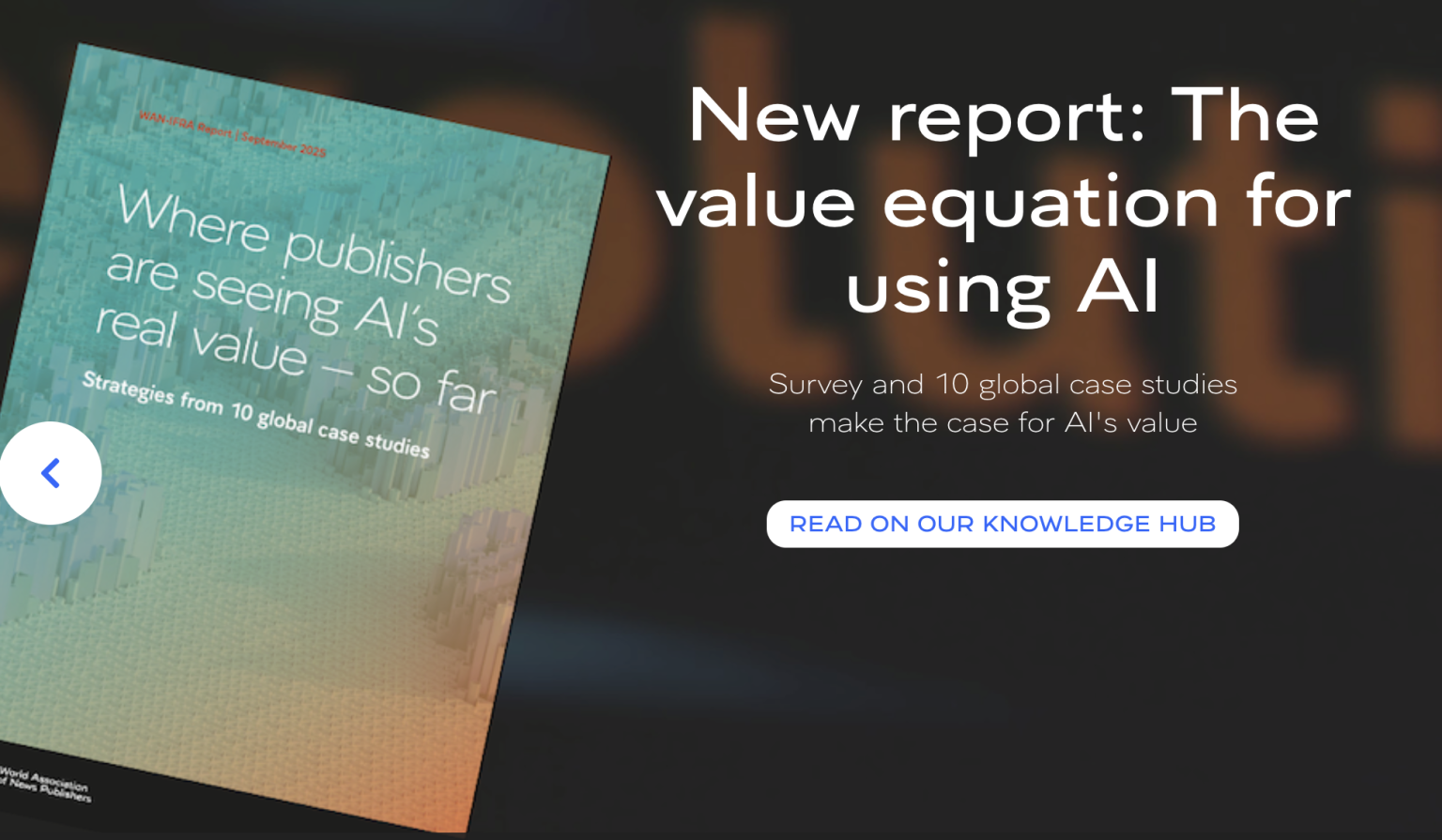Artificial intelligence is moving from pilots to practical use in newsrooms, improving efficiency, quality and speed, but revenue impacts remain limited, according to WAN-IFRA’s new report Where publishers are seeing AI’s real value – so far.
From a Q2 2025 survey of more than 100 media leaders and ten case studies, WAN-IFRA found just 9% of publishers could tie AI directly to revenue growth. By contrast, 75% reported efficiency gains, 64% saw higher content quality, 55% faster publishing and 44% better resource allocation.
Ezra Eeman, Director of Strategy & Innovation at NPO and WAN-IFRA AI Strategic Advisor, said value should not be measured only in cash terms: “Cost reduction, quality improvements, speed gains, and better resource allocation deliver value faster and more measurably.”
Examples cited in the report include:
- The Hindu (India): higher click-through rates, longer sessions and more subscriptions through personalised recommendations and push alerts.
- Schibsted (Norway): a 75% rise in front-page subscription sales using real-time personalisation.
- United Daily News (Taiwan): 200% growth in ad performance and subscriber conversions via AI-driven optimisation.
- Financial Times (UK): pattern-recognition tools to support investigative reporting.
- NTM (Sweden): reach extended through an AI-powered audio news service.
- Legit.ng (Nigeria): halved translation times and stronger fact-checking.
- AsiaOne (Singapore): a 40% reduction in sales staff and a 20% revenue boost through AI ad classification.
- South China Morning Post (Hong Kong): more than 300 hours saved each month with AI summarisation, editing and translation.
For Gannett in the US, embedding AI across its 200-plus outlets is framed as essential. “The real risk isn’t AI replacing you. It’s someone using AI replacing you,” said Jessica Davis, Vice President of News Automation and AI Product.
Yet outside newsrooms, the risks are mounting. A US court in San Francisco recently scrutinised a $1.5bn settlement involving Anthropic, accused of scraping hundreds of thousands of books to train its chatbot. And as consumers rely more on AI summaries in search tools, traffic to publishers is falling sharply — The Atlantic reported a 34% drop linked to Google’s AI Overviews.
For now, AI is helping publishers work faster and smarter, rather than replacing journalists. As Rahaman Abiola, Editor-in-Chief of Legit.ng, put it: “For us, AI is not about replacing journalists – it’s about giving them more time to do real journalism.”
Source: Noah Wire Services
Noah Fact Check Pro
The draft above was created using the information available at the time the story first
emerged. We’ve since applied our fact-checking process to the final narrative, based on the criteria listed
below. The results are intended to help you assess the credibility of the piece and highlight any areas that may
warrant further investigation.
Freshness check
Score:
10
Notes:
The narrative is based on WAN-IFRA’s latest report, published on 8 September 2025, which is the earliest known publication date for this specific content. The report is original and not recycled from other sources. As a press release, it typically warrants a high freshness score. No discrepancies in figures, dates, or quotes were found. The content is current and relevant. No earlier versions show different information. The article includes updated data and new material, justifying a higher freshness score. No similar content has appeared more than 7 days earlier. The report is original and not recycled from other sources. As a press release, it typically warrants a high freshness score. No discrepancies in figures, dates, or quotes were found. The content is current and relevant. No earlier versions show different information. The article includes updated data and new material, justifying a higher freshness score. No similar content has appeared more than 7 days earlier. The report is original and not recycled from other sources. As a press release, it typically warrants a high freshness score. No discrepancies in figures, dates, or quotes were found. The content is current and relevant. No earlier versions show different information. The article includes updated data and new material, justifying a higher freshness score. No similar content has appeared more than 7 days earlier.
Quotes check
Score:
10
Notes:
The quotes in the narrative are unique to this report, with no identical matches found in earlier material. The wording is consistent throughout, with no variations. No online matches were found for these quotes, indicating they are original to this report. This suggests the content is potentially original or exclusive.
Source reliability
Score:
10
Notes:
The narrative originates from WAN-IFRA, a reputable organisation in the media industry. This adds credibility to the content. The report is based on a survey of over 100 media leaders and ten detailed case studies worldwide, indicating thorough research and reliability.
Plausability check
Score:
10
Notes:
The claims made in the narrative are plausible and supported by the case studies presented. The examples of AI applications in various newsrooms are consistent with known industry trends. The language and tone are appropriate for the topic and region, with no inconsistencies or suspicious elements. The structure is focused and relevant, with no excessive or off-topic details. The tone is professional and typical of corporate or official language.
Overall assessment
Verdict (FAIL, OPEN, PASS): PASS
Confidence (LOW, MEDIUM, HIGH): HIGH
Summary:
The narrative is original, timely, and sourced from a reputable organisation. The claims are plausible and supported by detailed case studies. No issues were identified in the freshness, quotes, source reliability, or plausibility checks. Therefore, the overall assessment is a PASS with high confidence.






